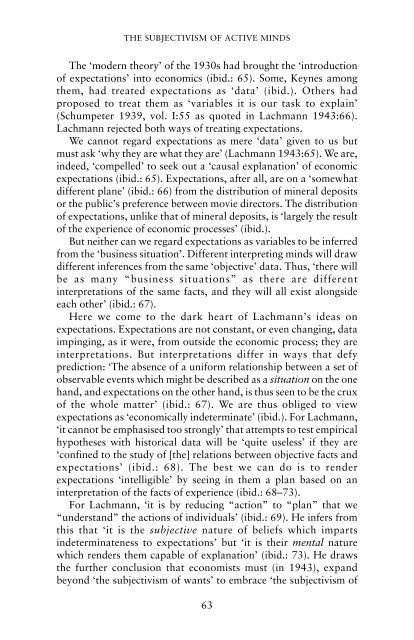Subjectivism and Economic Analysis: Essays in memory of Ludwig ...
Subjectivism and Economic Analysis: Essays in memory of Ludwig ...
Subjectivism and Economic Analysis: Essays in memory of Ludwig ...
Create successful ePaper yourself
Turn your PDF publications into a flip-book with our unique Google optimized e-Paper software.
THE SUBJECTIVISM OF ACTIVE MINDSThe ‘modern theory’ <strong>of</strong> the 1930s had brought the ‘<strong>in</strong>troduction<strong>of</strong> expectations’ <strong>in</strong>to economics (ibid.: 65). Some, Keynes amongthem, had treated expectations as ‘data’ (ibid.). Others hadproposed to treat them as ‘variables it is our task to expla<strong>in</strong>’(Schumpeter 1939, vol. I:55 as quoted <strong>in</strong> Lachmann 1943:66).Lachmann rejected both ways <strong>of</strong> treat<strong>in</strong>g expectations.We cannot regard expectations as mere ‘data’ given to us butmust ask ‘why they are what they are’ (Lachmann 1943:65). We are,<strong>in</strong>deed, ‘compelled’ to seek out a ‘causal explanation’ <strong>of</strong> economicexpectations (ibid.: 65). Expectations, after all, are on a ‘somewhatdifferent plane’ (ibid.: 66) from the distribution <strong>of</strong> m<strong>in</strong>eral depositsor the public’s preference between movie directors. The distribution<strong>of</strong> expectations, unlike that <strong>of</strong> m<strong>in</strong>eral deposits, is ‘largely the result<strong>of</strong> the experience <strong>of</strong> economic processes’ (ibid.).But neither can we regard expectations as variables to be <strong>in</strong>ferredfrom the ‘bus<strong>in</strong>ess situation’. Different <strong>in</strong>terpret<strong>in</strong>g m<strong>in</strong>ds will drawdifferent <strong>in</strong>ferences from the same ‘objective’ data. Thus, ‘there willbe as many “bus<strong>in</strong>ess situations” as there are different<strong>in</strong>terpretations <strong>of</strong> the same facts, <strong>and</strong> they will all exist alongsideeach other’ (ibid.: 67).Here we come to the dark heart <strong>of</strong> Lachmann’s ideas onexpectations. Expectations are not constant, or even chang<strong>in</strong>g, dataimp<strong>in</strong>g<strong>in</strong>g, as it were, from outside the economic process; they are<strong>in</strong>terpretations. But <strong>in</strong>terpretations differ <strong>in</strong> ways that defyprediction: ‘The absence <strong>of</strong> a uniform relationship between a set <strong>of</strong>observable events which might be described as a situation on the oneh<strong>and</strong>, <strong>and</strong> expectations on the other h<strong>and</strong>, is thus seen to be the crux<strong>of</strong> the whole matter’ (ibid.: 67). We are thus obliged to viewexpectations as ‘economically <strong>in</strong>determ<strong>in</strong>ate’ (ibid.). For Lachmann,‘it cannot be emphasised too strongly’ that attempts to test empiricalhypotheses with historical data will be ‘quite useless’ if they are‘conf<strong>in</strong>ed to the study <strong>of</strong> [the] relations between objective facts <strong>and</strong>expectations’ (ibid.: 68). The best we can do is to renderexpectations ‘<strong>in</strong>telligible’ by see<strong>in</strong>g <strong>in</strong> them a plan based on an<strong>in</strong>terpretation <strong>of</strong> the facts <strong>of</strong> experience (ibid.: 68–73).For Lachmann, ‘it is by reduc<strong>in</strong>g “action” to “plan” that we“underst<strong>and</strong>” the actions <strong>of</strong> <strong>in</strong>dividuals’ (ibid.: 69). He <strong>in</strong>fers fromthis that ‘it is the subjective nature <strong>of</strong> beliefs which imparts<strong>in</strong>determ<strong>in</strong>ateness to expectations’ but ‘it is their mental naturewhich renders them capable <strong>of</strong> explanation’ (ibid.: 73). He drawsthe further conclusion that economists must (<strong>in</strong> 1943), exp<strong>and</strong>beyond ‘the subjectivism <strong>of</strong> wants’ to embrace ‘the subjectivism <strong>of</strong>63

















